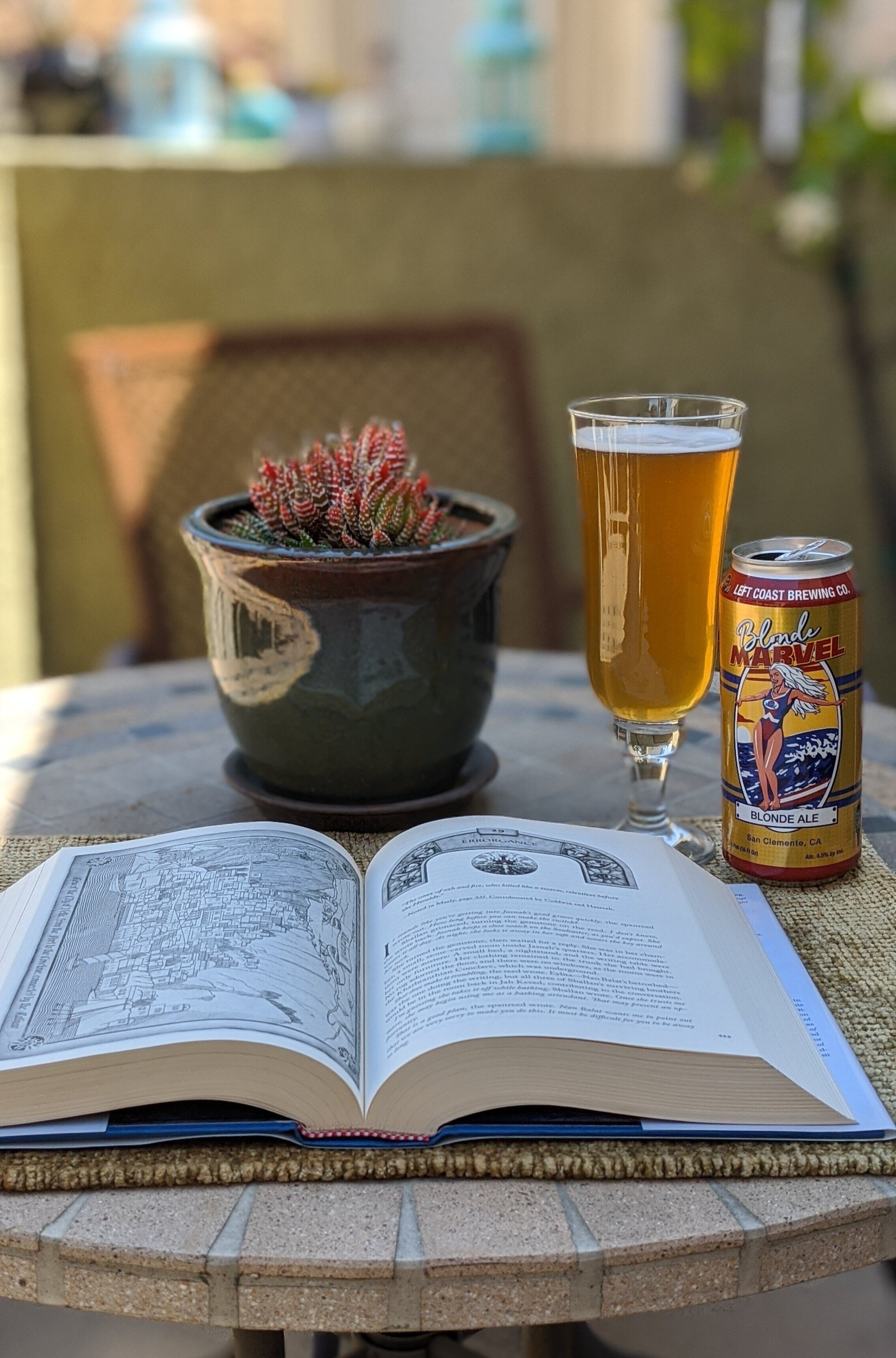When I read Elantris during the summer of 2018, I was impressed, but The Way of Kings is next storming level.
This one-thousand-seven page epic is just the first of a planned ten-novel series that already has at least one novella (Edgedancer, 2017) on bookstore shelves, virtual or otherwise, to sate voracious fans awaiting the fourth behemoth. I cannot imagine how author Brandon Sanderson plans to fill ten to eleven thousand pages, but I will say this. Despite the incredible length of The Way of Kings, I was not bored at any point. That is astounding. I have read some three-hundred page books that struggled to hold my attention throughout, but Brandon Sanderson managed to enthrall me from beginning to end. Every page was full of interesting details that exploded my imagination. Print copies are further enriched by beautiful chapter header artwork and full-page illustrations and maps. I spent several minutes perusing each of these, drinking in every detail.
Brandon Sanderson eschews the traditional fantasy races like dwarves, elves, and orcs in favor of a rich variety of human cultures with their own traditions and physical attributes. The only exception to that might be parshmen who are described as having human or human-like physiology but they have another quality that is certainly extraordinary. Sanderson teases details about these different cultures throughout the story and by the time I flipped to the last page of the novel, I had some understanding about a few of them but yearned for more. Sanderson offers little in the way of direct explanation, instead allowing me to explore and imagine on my own and when a new piece of information is provided, to chew and savor. The Way of Kings is one of those epic fantasy novels that delights in slowly dragging the reader deeper into its world. I loved every second of it and am in no hurry to escape it.
Living among the characters of Sanderson’s world are a diverse ecology of flora and fauna. Aside from horses, there are no recognizable animals in this world. Oh sure, one can recognize the earthbound inspirations for Sanderson’s creations, but the animals living on Roshar are strange and magnificent and I do not want to pet any of them. I was fascinated by the plant life and its sentience, reacting to outside stimuli, hiding like a timid animal and slowly reemerging when the coast is clear. Even the weather and the seasons have a strange, otherworldly quality to them. Such details were a warm blanket on a cold night and burrowed deeper.
Magic systems are important to epic fantasy fans. BookTubers produce entire episodes ranking their favorite magic systems and discussing in detail which are the best and which authors they think need to put a little more effort into the mystical actions their characters take. Personally, I do not think about it quite that much but I certainly do recognize and appreciate when an author has put extra effort into designing a system of magic that has rules and makes sense. Throughout his career, Brandon Sanderson has established a reputation for being one of those authors and in The Way of Kings, he introduces readers to characters with astounding abilities and then slowly sprinkles bread crumbs of information such that by the time the story is over, we understand the basic rules but still have so many questions. This is a great trick, especially when one intends to write nine more novels in the series. I expect to learn more about this Stormlight and how it can be harnessed in book two.
As Brandon Sanderson himself stated in an article on Tor.com, “I do put a lot of effort into the magic in my books. But a great book for me isn’t about a magic, it’s about the people that the magic affects.” As such, the characters in The Way of Kings are probably real people you can meet provided Brandon brings them along to his book signings. When I read Elantris, I loved the main characters and was surprised when I was drawn in by the villain’s story and felt some measure of empathy for his plight. The Way of Kings is no different. There are heroes and there are villains, but all of them are interesting and breathe. I identified with Kaladin the most because I recognized in his actions what I had hoped to accomplish in my former career. I was not successful and so I rooted for him to succeed that much more. The scholar in me envies Shallan and I want nothing more than to spend a day with her in one of the Veil balcony alcoves, reading books and discussing philosophy. I grew up in a family of military men — we can trace our military roots back several generations and therefore have tremendous respect for our men and women in uniform — and thus I admire and fear for characters like Adolin and Dalinar, but am thrilled when they are on the page because their adventures are just so storming exciting! Szeth-son-son-Vallano, like Hrathen in Elantris, is one of those villains deserving of sympathy and about whom I want to know so much more.
Another aspect of this novel that inspired me is the philosophical discussions. Throughout the novel, characters debate topics such as theology and faith, ethics and morality, prejudice and classism. Sanderson does not do it in a superficial way either. He presents valid arguments on both sides of the discussion and a handful of times, I actually set the book down to ponder what was just stated. I love it when a fantasy novel — a genre not given much credit in literary circles — has something profound to say about the real world. That is really every author’s goal but I feel like fantasy authors are largely ignored in this respect. Hopefully, authors like Sanderson can break through.
I love this book so much. For the past couple of years, my New Year’s Resolution has involved a pledge to read a book that I have been putting off for one reason or another. I had heard incredible things about The Way of Kings and so purchased a copy several years ago, but since then, it has sat on my shelf. The sheer size and weight of it intimidated me. Until six months ago, I was working a job that did not afford me much leisure time and so reading a novel the size and depth of The Way of Kings did not seem possible. I left that job in December and so in January I decided that in 2020, I would finally read this behemoth that had put Brandon Sanderson at the top of the fantasy author pile. Thanks to a buddy read hosted by my friend Dean Ethington, I can finally check The Way of Kings off my list of shame, off my TBR, and off my #20BooksIn2020 list. More than all of that though, I have taken the first step into an amazing fantasy world and I am excited to continue that journey.



